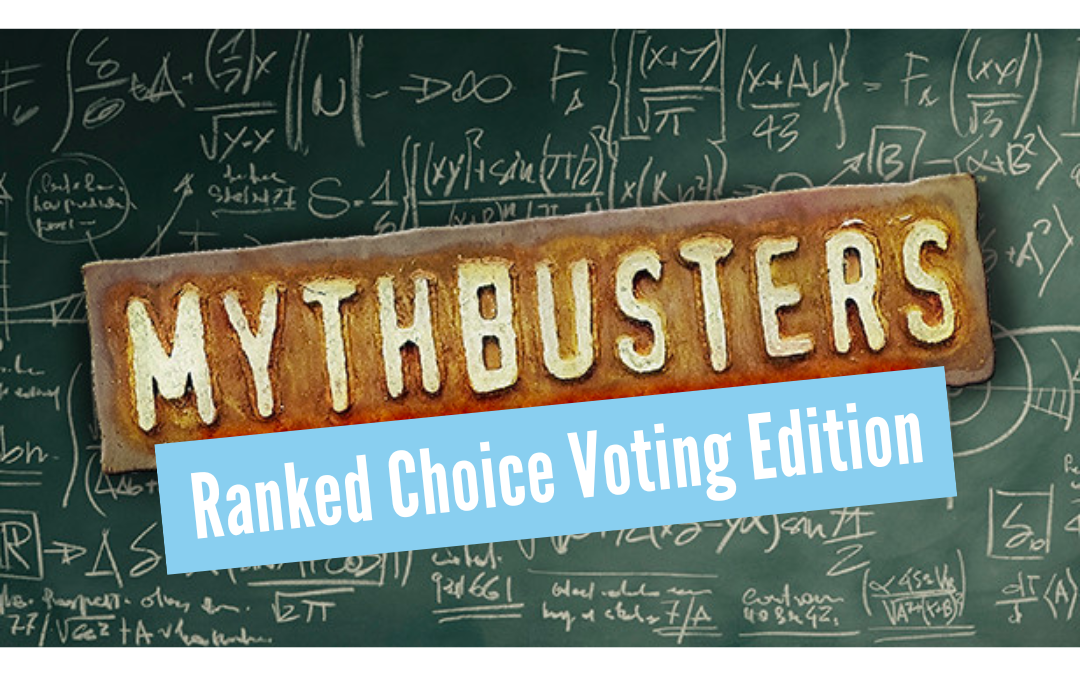UAWD supports ranked choice voting—also known as “instant run-off voting”—because it’s the best and most democratic way to vote. We all agree that there should be a run-off election. But instead of waiting months for another run-off election in March 2023, when we should be focused on bargaining our contracts, we can have an instantaneous run-off using ranked choice voting this fall. Learn more about ranked choice voting and why it works.
The UAW supported ranked choice voting when it was on the ballot in Massachusetts in 2020. The Administration Caucus only now opposes ranked choice voting because they think they’ll do better in a low-turnout run-off election in the winter, when it’s harder for candidates to campaign at the plant gates. You might hear some of these myths from them about why ranked choice voting doesn’t work—let’s bust them together.
Myth #1: “1 Member 5 Votes”
Claim: RCV violates “One Member, One Vote.”
- Every member still has one vote in ranked choice voting. It doesn’t give any person an extra vote any more than a traditional run-off does—it’s just another way of doing direct elections. We can all agree that run-offs don’t violate 1M1V, and RCV is just a way of doing an instant run-off!
- With RCV, you’re not filling out multiple ballots like you would in a traditional run-off. You get one ballot, and you rank your preferences. RCV lets your one vote communicate your full ordered preference.
- The Administration Caucus opposed One Member, One Vote—don’t fall for them pretending to care about it now. The AC’s main argument against direct elections was that it would cost too much money! Now they want it to cost millions of dollars more so they can run an unnecessary run-off election that protects incumbents. We fought for One Member, One Vote, and this is what we want!
Myth #2: “You’ll be forced to vote for people you don’t want”
Claim: You must vote for all candidates, forced to vote for people you disagree with.
- You DO NOT have to vote for all candidates on the ballot. You only need to rank your top candidate or candidates if you would like—you can leave as many slots blank as you want to. You can rank every candidate, but you don’t have to.
Claim: You cannot vote based on your beliefs.
- RCV means that get to vote your values! If somebody aligns with you, even if they’re not your #1 choice, you can rank them on your ballot without worrying about them being a spoiler. And if someone is an absolute no-go for you, you don’t have to rank them at all.
Myth #3: “Votes will be thrown out”
Claim: Your vote may not be included in the final vote count.
- False. If you vote, you have voted. If your first choice candidate is eliminated, your vote is automatically counted toward your second choice.
- There’s no “final vote count”, because these “run-off” elections happen automatically.
Claim: Your vote can easily be thrown out because you don’t understand the process, or vote for too many or too few candidates.
- All they’re telling you here is that they think you’re too dumb to understand how ranked choice voting works—you are not!
Claim: Retirees are more likely to have their votes thrown out.
- Every vote is a vote. Ballots are still anonymous, so there’s no way of knowing whether a particular ballot belongs to a retiree. It is the same thing as a runoff—it’s just instantaneous!
Claim: Ballot counting software for RCV is inaccurate.
- No, RCV used the same election companies, the same voting machines, and the same software. This is the exact type of miscommunication that the right wing uses, and it is shameful to see the Administration Caucus copy right-wing, anti-union talking points!
Myth #4: “RCV is unproven and scary”
Claim: RCV elections are chaotic for everyone.
- You actually receive fewer ballots using RCV than with run-off elections. With RCV, you vote a single time—ranking only the candidates you want to rank, then turning in your ballot. There’s no checking your mail multiple times over many months for your ballot.
Claim: RCV is an unproven method of voting.
- Cities and states across the country have used RCV for decades with excellent results.
- New York City uses ranked choice voting for their mayor and city council.
- Cambridge, Massachusetts, just elected a pro-labor UAW-endorsed mayor using RCV.
- Maine and Alaska switched to RCV specifically because minority candidates were being squeezed out as votes were split—it’s actually a way to make sure the most desired candidate wins, not just whoever is left over after votes are split.
- Other countries, including New Zealand, Australia, Northern Ireland, Scotland, Ireland, and Germany, all use versions of ranked choice voting in federal elections.
Myth #5: “RCV lets minority interests influence our union”
Claim: Voter frustration causes lower vote turnout.
- The rules are different, but they’re simpler: rank the people you want in the order you want them. You don’t have to rank anyone you don’t want to.
- Ranked choice voting actually ensures higher turnout. A run-off election months later will always have far lower turnout than the general election.
- This is especially true in our IEB elections because we’d have a dead period over winter as we wait for a March run-off (which the Administration Caucus is counting on). It’s better to have an “instant run-off” with RCV and know we’ll have our board elected ahead of our 2023 contract negotiations.
Claim: Anti-UAW members in our rank and file will have more influence than you.
- We are all UAW members, and there are no anti-UAW members in our rank-and-file. That’s what they say to divide those of us who want reform, instead of working together. Each of our votes is worth the same: One Member, One Vote!
Claim: UAW members can intentionally vote to eliminate the best candidate.
- This is actually less possible with RCV, because candidates aren’t splitting votes in the way we’ve seen happen in non-RCV elections.
- You vote for who you think is the best candidate—they’re referring to the fact you may vote against the candidate they think is best.
Claim: It destroys union solidarity and turns members against one another.
- RCV actually discourages negative campaigning! Candidates can’t get into the dirt and sling mud, because they want to win their opposition’s supporters and be their #2 vote!
- It encourages positive campaigning. We want to hear every candidate’s positive vision for our union.

